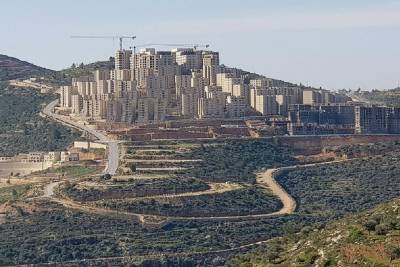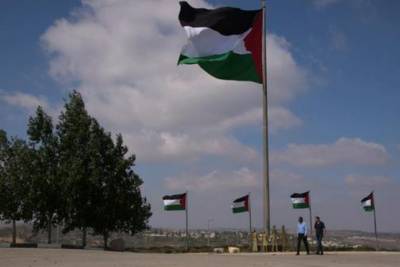Two Decades After Oslo, A Look at Life in Israel and Palestine
In These Times - Marilyn Katz - While in the Middle East last October, I saw firsthand why ending occupation is so necessary— and why it will be so difficult.
Rawabi is a new city being constructed in the West Bank by and for Palestinians. Finding an Israeli-Palestinian driver willing to do so, I crossed from Israel by checkpoint into the West Bank. Halfway between Ramallah and Nablus we left the dry desert floor and climbed into the hills, covered by surprisingly lush green pines and olive trees. About five miles later I saw a sight that moved me: a Palestinian flag atop a mountain.
As we drew closer I saw two modern mid-rise buildings. This was Phase I of Rawabi, the first entirely new city to be built in the West Bank—and one built almost exclusively with Palestinian labor and Palestinian and Qatari money.
The two buildings I saw will soon house 1,000 families on either side of an expansive plaza anchored by a retail and commercial center under construction. Walking on the site, I peered down the hillside, seeing the outlines of a 20,000–seat amphitheater that is being carved into the side of the mountain on which the city sits. To my left three schools were under construction; to my right I saw the cornerstones of both a mosque and a church.
Planned for an eventual population of 40,000, the first homes in Rawabi have been sold. This year, developers tell me, the first 3,000 people will move in. It is a bold endeavor with great impact already. Rawabi corporation is the largest private employer in the West Bank. All construction work and preparation is done on site. Palestinians quarry and cut the stone, and mix the cement. All engineering, architectural staff and builders are Palestinians, and when European expertise is needed, the consultants are paired with Palestinians to ensure knowledge transfer. The developers estimate that 8,000 people will be employed in the construction of Rawabi; one-third of its engineers are women.
The development, however, is not free from the burden of occupation. There have been continuous battles over access for deliveries on the Israeli-controlled road, and knowing that Israel could cut off the supplies of steel or other needed goods at any time, most building materials must be created or kept onsite.
The current battles are about water and telecommunications. The Israeli government has yet to allow Rawabi access to the water it controls. Similarly, while Rawabi’s future as a commercial and residential hub will depend on whether they have 4G Internet service, Israel has not allowed
any part of the West Bank to have it.
For Bashar Masri, the entrepreneur behind the project, Rawabi is about creating a sustainable community in the desert and about nation-building—about thriving in the midst of oppression, about demonstrating capacity and creating economic opportunity.
Veterans of stone-throwing and prison themselves, Rawabi's developers assert that they are creating a new path, one that challenges the occupation at every step.
Later that day, a Palestinian friend explained to me, “Occupation is not a concept. It is a reality that circumscribes and limits the action and the lives of every Palestinian each and every day.
Forms of resistance may vary, but every act—whether it be a stone thrown out of boredom or desperation or a building … built despite the Kafkaesque barriers put in its way—is real, pervasive and indicative of a people which plans and hopes are not to die as martyrs but to live, prosper and build a nation in the process.”
This is occupation—and Rawabi is one more compelling reason to end it.
To view original article, Click Here.



